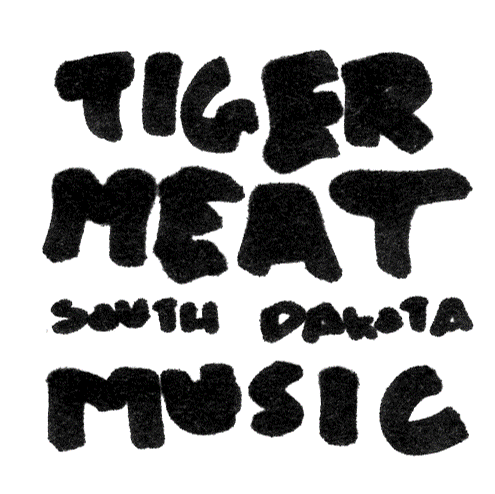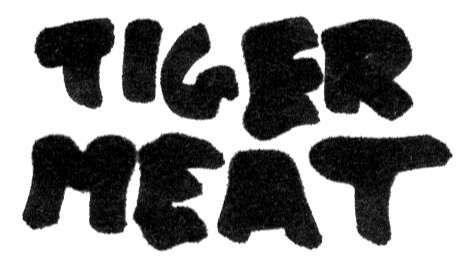The Whitechapel Club
The Whitechapel Club (B)
2022 | Rock
— track 11: “The Pulpit and the Prosperity Gospel”
Jesse Logterman: I do the lyrics, singing, guitar, synth. But with the orchestrations — I don't know if you've seen AirGigs online, you can do for-hire stuff for basically anything on there — there's a lot of string players and horn players. So to take "Separation Song" as an example, that's me playing pianos and some synths, and then Maria Grigoryeva on violin and viola, and then Sophie Creaner is clarinet and flute on that one. Maria's in Russia and Sophie is from the UK. There's one guy named J David Carrera that's done some pedal steel, and then another does some pedal steel and did some lap steel, Jess Perkins. That's why it takes so long, the money thing, I can't just pay for it all at once. I'll be like, “Okay I got my paycheck from my job, so my little bit that I keep for myself, I'll order a horn track or whatever.” [laughs]
With the drums, I'll write something on FL Studio, or program it in Pro Tools or something, and then one of my drummer friends will basically interpret it and make it like a real drummer would play it. Phil comes in to drum it and he's like, "Oh, this is impossible," because I don't know how to play or write for drums, but then he figures out a way to do it. Phil Mueller, he's been in lots of bands like March In Arms, Amos Slade, Foley. Josh Boyd is from Sinking Steps...Rising Eyes and Roman Ships. Adam Jones, he's in that Amidon Affair/Burlap Wolf King gang, he did some drums on the first album [2018’s The Whitechapel Club (A)] and a couple guitar tracks on this album [(B)]. And there were other people from the first album that I didn't get on this one just because of the pandemic, it kicked in when I was about three quarters done. There's a few tracks on there where I either stole some old recordings that I did with another band and sampled some stuff, or I just kind of chopped up the demo drums and used loads of samples and loops. My friend John played a lot of bass on the last album, but I pretty much played all the bass on this one, which I don't love because I don't think I'm a great bass player. So [(B)] is a nice blend of people that I know and hang out with, and then the strings and horns, that's all people who I don't know and hire out.
//\\//\\//
I grew up on a ranch south of St. Francis, which is on the Rosebud rez. So it's one of those deals — and I haven't dug into the story enough — where you have the reservation and then the government pulled some more shit and white settlers and homesteaders could make their way in there, and that's how we ended up there. I grew up listening to KINI Radio, which was — now it's a Top 40 station, but back in the day, it was this blend of wacipi music, and the Catholic rosary, and multi-format weirdness. So yeah, Buddy [Red Bow], they'd play him and Jackie Bird and stuff. It was all over the place. It was pretty awesome. In grade school for field trips we would go to St. Francis Indian School to see Jackie Bird once a year and she'd play guitar and do hoop dancing — that was where I got into my young head that guitar was the coolest, but I never even got a guitar until high school. At my high school I didn't know anybody else my age who even pretended to play guitar, and there were two guys that drummed. Piano lessons were before the guitar, and my shitty version of playing guitar is very informed by the piano, I think.
Came to Sioux Falls for college [at USF in the early ‘00s] and my knowledge was a vacuum, just very naïve. And then that was right when Napster hit, so I'm absorbing all this music. I went to college with some of the people from Sinking Steps...Rising Eyes and some of the Nodes of Ranvier people. And it was just like, "Oh wow, it's a thing that you can go make your own music." It was really cool. I had a little band in college, Dragging Ashley Down. My eighth grade teacher, his name is Jason Reinders, he had this six-track recorder, so he let me mess around with that and learn how to record, and it just felt like wizardry, you know? [Dragging Ashley Down recorded at] his place, and it was very "college bedroom" type music. It was like ‘70s folk rock revival. I regret not trying to get out and play it.
So then later after college, I got into a band called De Nethermen, it was kind of synth rock before bands around here were doing much with synths. I mean, it was on the coattails of The Faint. That started around 2005, went through about 2009. I was starting to get inspired by more orchestrated music. I got into Sufjan Stevens and Patrick Wolf, both had pretty elaborate orchestrations. Sufjan often separates the traditional orchestrated music from the electronics. But Patrick Wolf blends it together, and that pointed towards the direction I wanted to go with my music.
I was never really, technically in any bands between then and now. I started doing some part-time studio work, recording other people like Rubber Gloves, and Talk Rock, and Roman Ships, and then the last Sinking Steps single that they did, that was pretty cool. I wish I would have [gone to school to study audio engineering]. Like I said, I was a naïve country kid and I didn't think that was a “real job” that you could do. [The studio is] in my house now. I was doing it in the basement, but it was totally unfinished. It's a hundred-year-old house, so it was just kind of gross. I totally ripped it apart, eventually we finished a couple of Talk Rock records down here and Talk Rock helped me finish [the basement studio] off. I tried to do some part-time commercial recording, like, we did a punk band split with International Cover-Up and Pass the Flask from Fargo down here. It was eight or nine dudes in a basement, and it was just hot and sweaty and gross [laughs]. It was like, eh, it's probably more of a “personal project” studio. It's more fit for that.
//\\//\\//
The Whitechapel Club all stemmed out of that early Dragging Ashley Down stuff, trying to get more orchestrated, and trying to do my own thing. I'm less precious about it now, but I used to be of the mindset, "You have to write and record it all now, and if you use old material you're recycling." Then I found out Radiohead and all sorts of people do it. So there's literally songs that I've done on this album, where the newest parts were written a couple months ago, but then the bridge was from 15 years ago. The stretch of three songs at the end [of (B)], those are some of the oldest songs that I have. They've been gestating for over a decade, and just being able to finish those is a point of pride.
Another big [point of pride] for me with that first project [(A)] and going into this one [(B)] was just getting more comfortable with lyrics. None of my songs are real, personal stories, but there's bits. I should mention, a lot of my lyrics are kind of negative, dark, or whatever. I'm not that person all the time. I just think it's really hard to write joyful music that feels good without crossing the Spinal Tap line between clever and stupid. It's hard to write really happy music without getting kind of corny and terrible [laughs]. I really respect people who are able to write good, happy music.
The cover art [is by] an artist named Will Cantor, I had them draw the boxelder bug and juniper thing. Like the whole idea of my naming scheme, I'm very interested in repetition. I have a book called Bitten By Witch Fever, it's a book of reproduction samples of arsenic-laden wallpaper. Back in the day they had the arsenic green paint, so the people were basically filling their homes with poison. So I was inspired by that. I also like things to be physical, so I printed the pattern off on actual fabric and then I have an actual LP sleeve that that is on, that's what I scanned in for the album art. Everything I do is way too complicated and needlessly involved.
I have no idea what’s next. I'm kind of in a project right now that we’ve been working on for a long time. It's basically Burlap Wolf King's backup band and the old Amidon Affair guys plus me. It's synth-rock-ish, again, called Silicon Heaven. I think we'll get it done soon, I hope [laughs]. It feels like, I don't know, maybe the Whitechapel thing is done and I can do my own music but a different thing, a different vibe. But if I think about it, it's probably something I'll never stop doing. The people who do a fake band — like Nine Inch Nails, if Trent Reznor feels like doing a thing, he'll grab a person and it's Nine Inch Nails, right? I could theoretically record myself playing Casio keyboard instrumentals and that could be The Whitechapel Club.
My friend asked me "Hey, do you think you would want to play this [live] sometime?" And I was just kind of like, "How?" You'd either have to drastically change it to more of a traditional rock band format, or somehow find all of these string players and it would be — like, it's almost a funny cliché now of the indie band with 14 people on stage. It would just be such an operation to put together. For me, it's more about this idea that I need or want to see realized for myself. And if anyone else thinks that's cool, that's awesome to me. All I ever really want is for one kid on the internet to find it, and for that to inspire them to make something better than what I'm doing [laughs]. Because I think everyone has that one band where you and five people know about it, and it's the coolest thing in the world to you. But the rest of the world ignores it [laughs].
JESSE LOGTERMAN’S ESSENTIAL SOUTH DAKOTA ALBUMS
Sinking Steps...Rising Eyes — Majestic Blue (2004)
Billy Music — Midwest Index (2001)
Talk Rock — Modern Gripe (2014)
John Hult — half a life to recover (2020)
SOURCES
Logterman, Jesse. Interview. By Jon Bakken. 12 July 2022.








